Do excuse the somewhat chunky rescaling of the photographs, too - I have no hope of getting this PC to create the usual smaller snapshots of each photograph to avoid the aliasing. As ever, do please click on a photograph if you'd like to see the original size.
Today: Maliandao. The tea-related aspects started at first light:
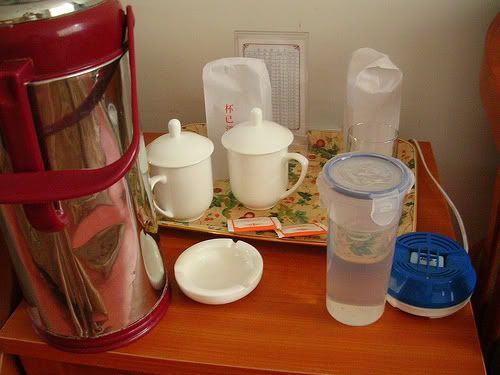
The Chinese predilection for hot water seems to be 50% belief in the fact that warm water is good for the stomach, and 50% down to the fact that unboiled water is undrinkable. It makes for a good start to the day, if you happen to have some old Gaoligongshan knocking around, though.
Beijing is actually rather nice this year. In previous years, our visits have been like locking oneself in a garage and starting the car motor. This time, there is no throat pain, no sore eyes, no aching ears, no headaches. They recently completed a test for a congestion car-exclusion scheme, but that was last week, and life is back to normal now - it's a pleasant effect, however it came about! The view from the window, of the university quarter, was quite fresh in the morning:
Maliandao is but a taxi-journey away. Following the advice of the Lonely Planet guide that we discussed before, I jumped into the front seat, opened my map, and pretended to know where I was. Pointing out landmarks, discussing the route - all good ways of avoiding taking a long route around the city at your own expense! The hub of most journeys to Maliandao, it seems, is the Carrefour supermarket: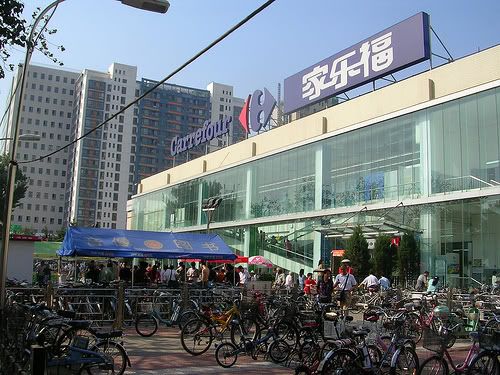
This might sound a bit trite, but there really are a lot of tea shops here. I wasn't prepared for the sheer scale of the operation. MarshalN (link to be provided when I can master the darned Chinese version of Windows XP) gave a map a while ago, showing the major malls. Each mall contains many, many individual tea businesses. Lots of the malls (and associated markets) contain tourist-laden green tea boxes, but some are more interesting. There are many thousands of tea shops here, without any exaggeration, and the number of people making their livelihood selling exactly the same produce is remarkable - it reminds me of Venice (though with a soul). Here's a typical tea-street, which extend in all directions ad infinitum: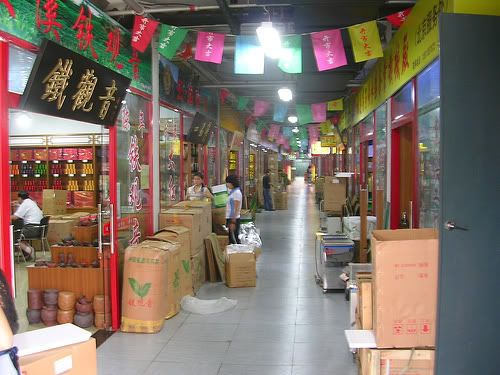
Thankfully, Lei gave me a "Chinese veto" with respect to owning any more teapots. This is a healthy thing, as clutter is of course bad, and we've got enough. The result is that I am absolutely immune to the many teapot and teatray shops. There are some lovely examples scattered around, but my eye stopped on none. I did rather like the carved wooden tables, no matter how absurdly ostentatious they are (though owning one would be a very different matter):
After skipping around the default Tea City mall next to Carrefour, I headed for some proper tea, in the Beijing Pu'er Chadu: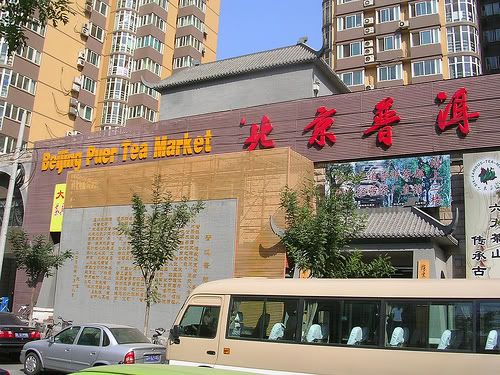
It's a big mall, several floors, containing tons of pu'er. I didn't know Menghai, Haiwan, and CNNP produced quite so much tea, but I'm sure that a large fraction of it (mostly 2007) was on display here, and around Maliandao. So much of the stock on offer is from these three basic factories. I checked out the place shop by shop, dipping into interesting places and generally "walking slowly" (as most shop owners say to you in Daoist-style parting words). I didn't find very much of interest, the overwhelming majority being exceedingly bland - and that was deliberately avoiding most 2007 cakes, and generally sticking to the 2000-2005. However, when I visited the lavatory, I happened to come across the following gentleman: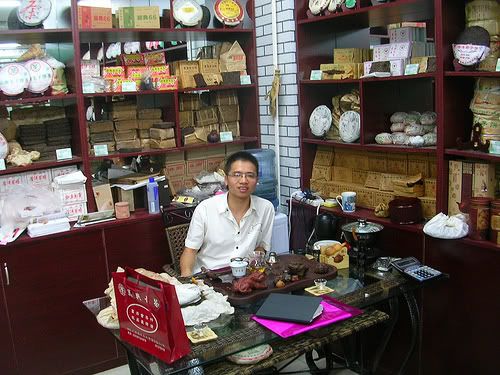
When I entered what turned out to be his shop (and rather tastefully-attired it was too, just out of shot), he was losing at a computer game that I used to play many years ago. He turned out to be fantastic conversation, being very sincere and amusing. Between my poor ability at Chinese, and his decidedly less poor English, we met half-way (or maybe 80-20 in his favour!), and I spent a good three hours drinking his private teas that he didn't have for sale.
It turns out that his father's brother recently started the "Linbo Mengku" factory, of course in Shuangjiang, in Lincang. Lots of stock on the wall was understandably from them. We eventually got around to them, and they were, at least, somewhat less uninteresting than many of the other cakes I'd tried up until that point. The high point was discovering a truly vast quantity of 2000 Xiaguan Tuocha, which (after lunch together and our long session), he put down at a decidedly low price - I felt rather embarrassed to be talking money with someone that I had come to consider a friend, and it seemed the feeling was mutual. I grabbed a few 5-piece tubes (dark, woody, surprisingly well-aged and pleasant for 7-year tuocha) and resolved to return. I pointed out many of the English-language tea vendor sites to him for his reference. Much eyebrow-waggling ensued.
A little later, I was becoming rather disenfranchised with the whole affair, having tried so very much average tea (even trying to be selective), which I surely put down to my own failings. A later oasis was Xiaomei's shop, a friend of MarshalN - everyone there knew him very well. I hope she'll excuse the photograph: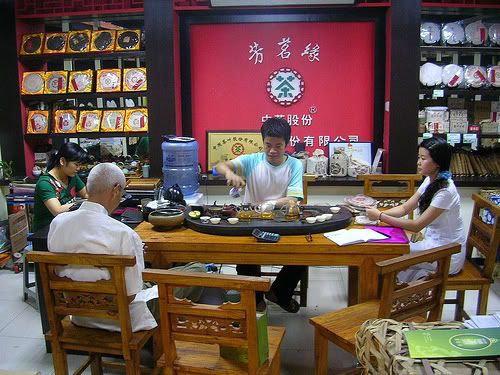
(Xiaomei seated right, her little brother in the host's chair.) We started out with a 1995 shengpu, and moved on to a cake that both she and MarshalN found to be very enjoyable (2005 Yisheng cake from Yiwu leaves). Following her fine recommendations, we soldiered on through a 2006 Douji, and a 2007 Zhuyanhao - not quite up to the Yisheng, but good enough in their way. Some of these left the shop with me after our two-hour session. She was a very generous hostess indeed.
A return to the disappointing tea-wandering state from before, I scoured the enormous Chayuan mall: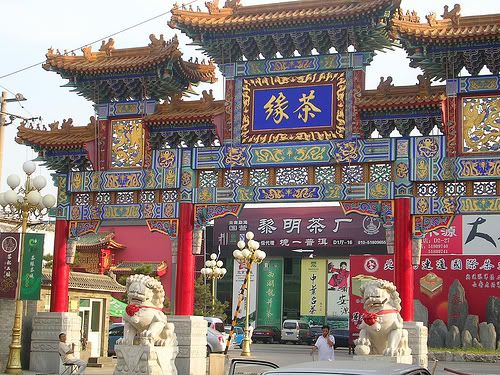
This was huge beyond all belief, filled with all manner of tea shops. Again, lots more bland tea from all sides. I eventually made it to the Guoyan shop, and thought for a reprieve. The result was, unfortunately, lots more bland tea - but the host and her daughter were great fun:
It's always sobering to meet a small child whose ability to speak Chinese totally eclipses my own.
Finally, I made it to a shop that sold Quanji cakes, one of MarshalN's noted factories from a previous tea-tasting that I'm sure you recall. Two sisters ran the place, and were very friendly, until their big sister returned (who owns the shop) at which point their expressions turned to stone, and it was "all business". The cakes were fairly uninteresting, and exceptionally highly priced!
Ending on this flat note, I jumped into the front seat of another taxi, and headed out.
The bargaining generally went well. I found a personable approach seemed to do the trick: making acquaintances first, swapping names, and so forth - and very definitely apologising in advance for the poor level of Chinese. Unlike the French, however, the Chinese really appreciate any attempt one makes to speak their language. They become very interested, active, helpful, and positive in general. Unlike my trips to France over the years! (Apostrophe: I've been studying French for about 20 years now, and I'd like to think I'm not entirely rubbish at it. Even then, speaking French to a French person really seems to upset them! Every time! Across the entire country!)
I was given a great tip in haggling: don't mention a number until as late as possible. Just don't do it! "Once you say a number, you can only go up", they say. So, let them open with a price. It would be tempting to enter your own at this point, but hold firm, and point out that it's invariably unrealistic, the tea doesn't justify that level, and so on. At some later point, enter with a low price - which, of course, is treated with derision. Go up very slowly! The price comes crashing down to earth. My favourite tactic is to slowly stand, make humming-and-hah'ing noises, and make to leave - often this gets a "zuoba!" [sit down], and a return to the bargaining process at a new plateau of lowness. As Bearsbearsbears wrote a long time ago, if they look happy when you leave - you didn't work hard enough!
There was one really frustrating to this process. I found a shop that sold the 2001 Menghai Special Yiwu that I, Davelcorp, and others really adore. They also sold 2004 Yangqinghao, and a few other treats. The vendor was super-gentle in tone. He gave a massive price, higher than Houde (given that this is China, you get the scale of its magnitude). It went like this:
Him: the price is X. [Where X is vast.]
Me: clearly, this is too high.
Him: the price is X. [in his really quiet, gentle voice]
Me: but seriously, what's your real price?
Him: the price is X.
Me: we both know the Taobao price is much lower than this.
Him: the price is X.
Me: even the Western price is cheaper than this.
Him: the price is X.
Me: how about Y? [where Y is a fair price, I think]
Him: the price is X.
Me: how about Y + margin?
Him: the price is X.
&c. &c. &c.
His stubborn refusal to move was made even more agonising by his silken, buttery tones! Argh!
Anyway, that's my Maliandao trip. I left the region considerably less excited about it than when I arrived, but having made some decidedly fine acquaintances. Tomorrow - temples, or something.
P.s. I got a surprise room-mate allocated to my room by the university organisers, an Israelian with a respiration rate of 30 breaths/min, and an interminable snore. After 3 hours of sleep, I gave up and am downstairs in the lobby typing this as the sun comes up, drinking some of that 2000 Xiaguan Tuocha - and darned good it is too. Small consolation...

Ahhh..haggling. My first experience with it was in 1997 in Nepal. I found the ritual of it tiresome at first; what I had to learn was to treat it lightly, like a game. Eventually, when I heard an absurd price, I would just laugh and make to leave immediately, at which point the vendor would quickly ammend. Maliandao would probably leave me numbed out from sensory overload, but I'm still curious. Maybe curious enough to go there some day.
ReplyDeleteI think I know which Yangqinghao store you're talking about. They're downstairs from Xiaomei's place?
ReplyDeleteMaliandao takes a lot of patience to separate the wheat from the chaff, and I think it's probably harder for you since you look different -- they often bring out the worst things for foreigners because they assume you don't know what you're doing and hope to rip you off.
The Quanji place, I have some reservations, particularly because of business practices. I got to know the owner, which brings prices down massively (think one quarter of original). Sigh....
Sorry :(
Enjoy the experience(s) the accumulative knowledge is priceless ..
ReplyDelete“The years teaches us lessons, the days never knew”
ps. I just dropped you an e-mail … john
I'm impressed by your immunity to tea pots!
ReplyDeleteXXX...
And, I actually prefer your large photos for Beijing - it suits the crudeness of the place!
ReplyDeleteWow - that sounds like a fascinating (and weary-ing) trip! So much tea, teaware, and struggling to communicate would wear me out quickly (I've experienced the whole French language thing for myself, and am glad to hear the Chinese are much nicer about it).
ReplyDeleteWhat a great experience though...thanks for sharing with us!
Dear all,
ReplyDeleteThanks for the comments - it's hard to get the comments system to work here, so please bear with me!
Leilei, I'm going back today! Don't speak too soon! :)
MarshalN, without your descriptions, I would have been totally lost. The Yangqinghao seller was just some random chap with a few YQH cakes in the Beijing Pu'er Chadu. I'm interested to go back and try and find the one you're talking about!
I really miss English breakfasts. Gloopy dofu really doesn't do much for a hungry morning stomach.
Toodlepip,
Hobbes :)
What a wonderful account, albeit it's a tiresome journey for you! Thanks for the "postacards".
ReplyDeleteXiaomei does look like a xiaomei.
Last night I happened to want to brew the 2001 Menghai Yiwu Special Order cake that you and Davelcorp love. I must say that this tea really hit my mood well and I thoroughly enjoyed it more than before. It was fragrant, aromatic, full of taste with a sweet and subtle aftertaste. It was quite lovely. Hmmm...
Hopefully you can get the seller to lower his X to your Y, or somewhere fair in between. I'm curious...how much is his X for the 01 Menghai Yiwu cake?
Sounds like you didn't even bother with the other types of tea.
Phyll